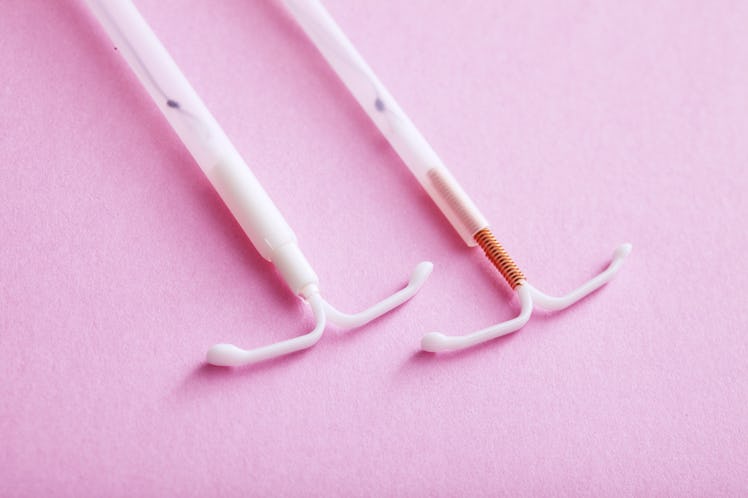
IUDs Are Ridiculously Effective At Preventing Pregnancy, Just So You Know
Choosing a birth control method can be tricky. Everyone’s body and contraceptive needs are different, and there is no “one-size-fits-all” solution to help avoid an unwanted pregnancy. But if you’re looking into your options, you might be wondering how effective the IUD is at preventing pregnancy. And you’re in for some good news — it’s a super effective choice, reducing your risk of pregnancy by more than 99%, according to Planned Parenthood. But it’s still not for everyone, so before you run to your doctor requesting one, here’s everything you need to know.
IUDs are one type of long-acting reversible contraception (LARC), which is a category of birth control that lasts for months or years without requiring constant action on your part to maintain its use. Unlike the birth control pill, which you need to take every day on schedule, an IUD is inserted into your uterus and can work for up to 12 years, according to Planned Parenthood, depending on which type you get. “[The] IUD is very effective as contraception [because] there is no human error to factor,” explains Dr. Tristan Emily Bickman, OB/GYN. While the pill’s effectiveness decreases if it is taken improperly (not following the specific directions given by your doctor), the IUD doesn’t require any day-to-day upkeep — just regular annual visits to your doctor to check that it is still properly in place.
IUDs are one of the most effective methods of reversible contraception out there, according to Planned Parenthood. Dr. Bickman reiterates this: “They are the most effective form of non-permanent contraception,” she tells Elite Daily. “They are reliable, convenient, safe, and easy to insert and remove.” It’s no wonder that they're rising in popularity. According to the Guttmacher Institute, a non-profit research and policy organization that provides statistics and resources on sexual health, 12% of contraceptive users in the United States chose an IUD in 2014, up from just 2% who used a long-acting reversible contraceptive in 2002. In a 2015 study, Planned Parenthood found that women’s health providers in the United States use IUDs more than any other method of birth control.
There are two major types of IUDs: hormonal and non-hormonal. Hormonal IUDs work by releasing a low level of the hormone progestin into the body, which thickens the cervical mucus to stop sperm from reaching your eggs. There are four brands of hormonal IUDs available in the United States, all of which last for three to seven years. The non-hormonal IUD is made with copper and lasts for up to 12 years. This IUD is "a great option" for anyone who cannot or does not want to take hormones, explains Dr. Adeeti Gupta, OB-GYN and founder of Walk In GYN Care.
IUDs start working immediately, according to Planned Parenthood, so as soon as you're ready to have sex after your IUD insertion, you are protected from pregnancy. All types of IUDs can be removed at any point if you would like to switch to a different method of birth control, or if you decide you are ready to get pregnant.
This is not to say the IUD is a miracle method that works for everyone. It can be physically unpleasant or painful to insert and may give some people unwanted side effects. Dr. Kecia Gaither, MD, MPH, FACOG, double board-certified in OB/GYN, explains that IUDs can come with “painful insertion … intermenstrual bleeding, irregular periods, [and] cramping.” According to Planned Parenthood, the copper IUD could make your period longer and crampier, while the hormonal versions can cause irregular periods or spotting between periods. In some cases, hormonal IUD users may stop getting their period altogether. In extreme cases, the IUD could migrate out of place and perforate the uterus or cause an ectopic pregnancy, but these incidents are extremely rare.
It’s also important to note that the IUD does not reduce your risk of STIs — it simply protects you from getting pregnant. Your best bet for STI protection is a condom, which can be used alongside an IUD or another method of birth control.
If you’re considering an IUD, the best thing you can do is talk to your doctor about it. Remember that all forms of contraception come with side effects, and this isn’t necessarily anything to be afraid of. A trusted healthcare provider can answer your questions and help you decide which method of birth control fits your needs and expectations. If that’s an IUD, great! And if it’s something else, that’s OK too. What matters most is that you’re taking control of your reproductive health and doing whatever is best for your body.